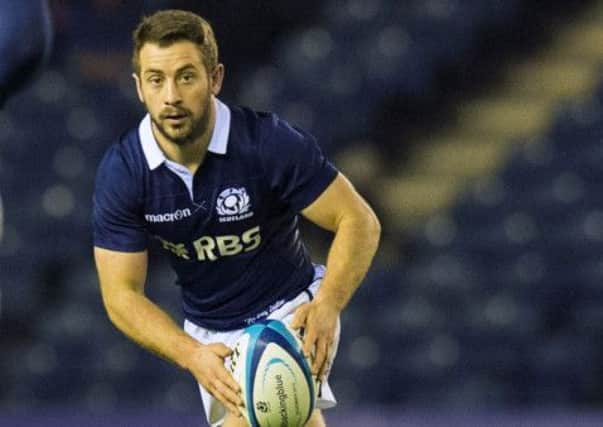Scotland may not have enough against Six Nations


At Pittodrie two years ago, we repeatedly opted to pop penalties into touch near the five-metre line, going for a try and disdaining the offer of three points. The try wasn‘t scored and the match was lost.
Now Greig Laidlaw made the same decision. Happily this time it was made good – but only at the fourth or fifth attempt. Other days, other seasons we’ve lost attacking line-outs, but this autumn the line-out has been excellent.
Advertisement
Hide AdAdvertisement
Hide AdWhether this is because Ross Ford has worked more successfully to improve the accuracy of his throw, or because the lineout has been better called by Jonny Gray, the result has been very pleasing. On Saturday the Scottish lineout was dominant. Indeed in the second half it scarcely mattered whose throw it was; Scotland won the ball.
The set scrum may be a mystery and a lottery. It was interesting to hear Ali Williams, the veteran New Zealand lock, say in the Cardiff studio that he hadn’t a clue what happened when a scrum penalty or free kick was given, and that the front-row were equally clueless.
But the lineout, on your own throw is, or ought to be, in your own control, and this autumn our lineout has been well nigh perfect.
CONNECT WITH THE SCOTSMAN
• Subscribe to our daily newsletter (requires registration) and get the latest news, sport and business headlines delivered to your inbox every morning
This is the first major improvement and the difference it makes to the course of the game is huge. The Gray brothers, Rob Harley and, in this match, Johnnie Beattie, have done exceptionally well – with thanks to Ross Ford.
In the first half we conceded nine penalties and 12 points to Tonga. Almost all were for offences at the breakdown. Referee J P Doyle was perhaps rather quick at blowing after a tackle – in Cardiff, Wayne Barnes was content to wait longer to see if the ball was going to emerge. But you play the referee of the day, and we were slow to recognise what he would not permit, and to adjust accordingly.
The defence was again good. Tonga never really looked like scoring a try, and we almost always have conceded one or two to South Seas teams, even when we have won the match.
If you discount the rather chaotic last ten minutes against Argentina, when the game was out of their reach and the field flooded with replacements, we have conceded only three tries – two of them to New Zealand – in 230 minutes of rugby. This is another big improvement. A team that makes it difficult for their opponents to cross their line is on the way to being hard to beat.
Advertisement
Hide AdAdvertisement
Hide AdThe other difference from last season is that we have had control at half-back. Greig Laidlaw has been playing the best rugby of his life, and Finn Russell has shown a maturity beyond his years.
The switch of direction to the blind side followed by the lovely pass which put Alex Dunbar in for a try (though Dunbar still had much to do) was a perfect example of vision.
Roll back the years and it was the kind of try John Rutherford used to create. Russell’s kicking from hand, apart from one charge-down, was again very good, his high diagonal which created the last try inch-perfect.
It has been a good autumn, but we should acknowledge that, compared to Ireland – who have defeated South Africa and Australia – we have so far achieved very little.
Given that New Zealand fielded an under-strength side against us, we should recognise that there will be stiffer tests in the Six Nations than any we have faced this November. We have to go to Paris and Twickenham where we haven’t won since 1999 and 1983 respectively.
France may have had what L’Equipe called “un bon coup de pied aux fesses” (a good kick up the backside) from Argentina on Saturday, but it’s only a week since they beat Australia.
England may have stuttered this month, but they lose very few Six Nations games at home. Ireland are now third in the world rankings as well as being Six Nations champions. I can’t think many neutrals would back us against them. That leaves Wales and Italy.
However, one should be wary of predictions. I’ve just looked up the report I wrote of the fine match in Cardiff in 2012. There is, I said, “the makings of a very good team here. All that is needed now is a few tries and victories. Both will come.”
Advertisement
Hide AdAdvertisement
Hide AdWell, they didn’t, or not often enough, and of that team only Stuart Hogg, Sean Lamont, Greig Laidlaw, Ross Ford and Richie Gray were playing on Saturday – and Laidlaw was then at 10 rather than 9.
However, to end on a happier note: last year Scott Johnson fielded 32 players in the autumn internationals and the starting XV kept being changed.
This year, Vern Cotter has trusted his first judgment. If there had been no injuries, then it’s likely that the same 15 players would have started every time. Consistency in selection is a first step to success. Ask our Grand Slam heroes of 1984 and 1990.
SCOTSMAN TABLET AND IPHONE APPS